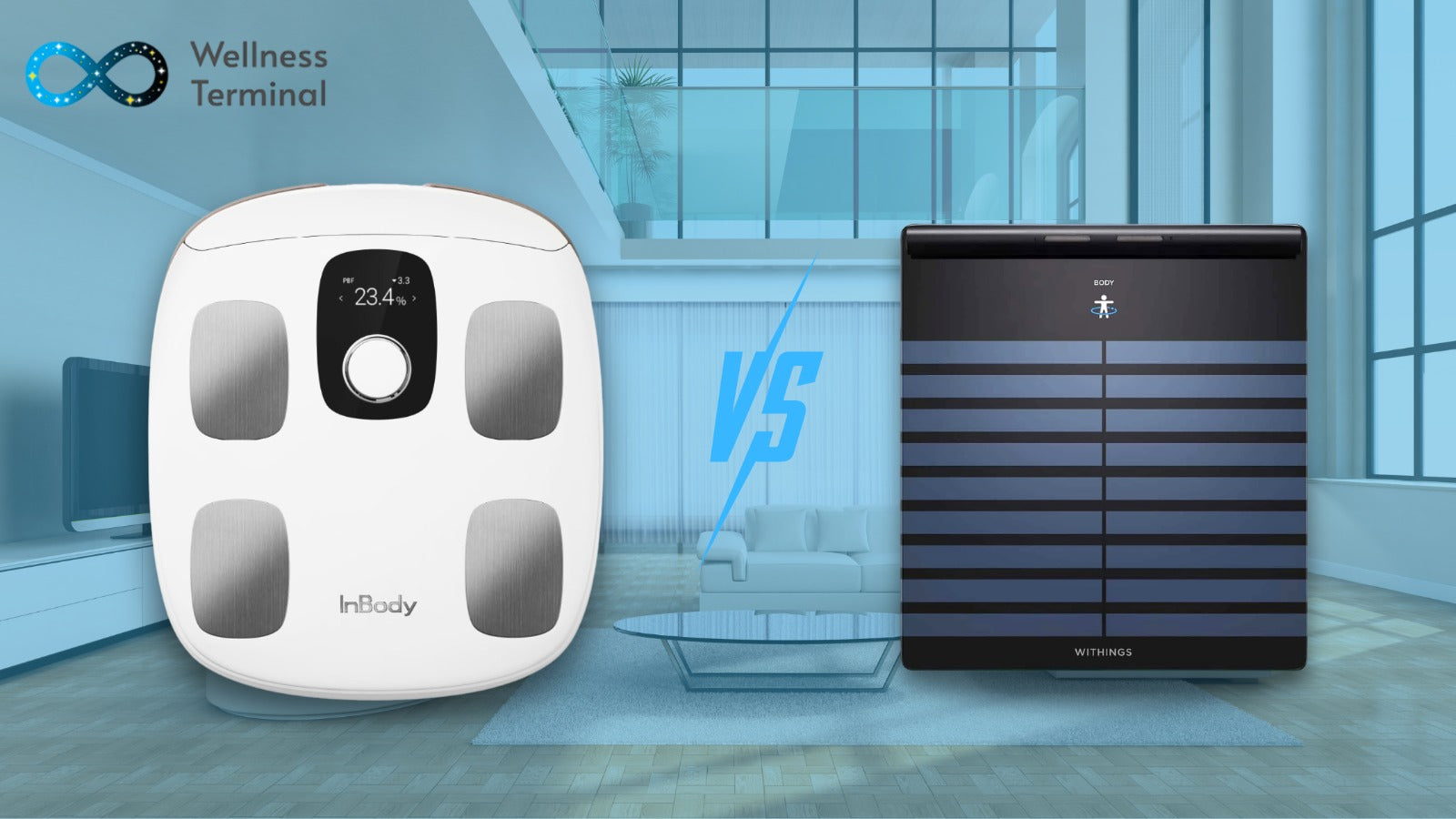Staying on top of your fitness means looking beyond just your weight. Modern body composition scales can tell you about your body fat, muscle mass, and even heart health – all from the comfort of home.
Two of the leading contenders in this high-tech arena are InBody and Withings, each offering a premium smart scale with advanced health metrics. In this comparison, we pit the InBody Dial H30 against the Withings Body Scan to answer the big question: Which body composition scale should you buy? We’ll dive into their accuracy, features, app experience, and value for money, so you can make an informed decision.
A 2021 study published in the National Library of Medicine found that professional-grade bioelectrical impedance devices have a strong correlation with gold-standard DEXA scans. This means choosing a quality body composition scale is important if you want reliable data.
Both InBody vs Withings claim to offer near-professional accuracy at home – but they take different approaches. Let’s explore what each brand brings to the table and which might be best for your fitness journey.
Introduction: InBody Dial H30 vs Withings Body Scan
Both scales use advanced bioelectrical impedance to measure fat, muscle, and more. But their focus is different.
InBody leans clinical and precise — built for performance tracking. Withings blends health data with user-friendly tech, perfect for wellness tracking.
InBody Dial H30: Built for Precision
The InBody Dial H30 brings professional-grade body composition analysis into your home. Using DSM-BIA and 8-point electrode technology, it offers accurate segmental measurements of fat, muscle, and water.
Its focus is clear: deliver clinical accuracy for fitness progress tracking, muscle gain, or fat loss — no fluff, just data you can trust.
Withings Body Scan: Wellness Meets Innovation
The Withings Body Scan is designed as a smart health station. It blends full-body composition with heart monitoring, nerve health, and lifestyle metrics into one sleek device.
Ideal for wellness enthusiasts, it delivers a broader health picture — perfect for those who want more than just weight and body fat readings.
Here’s a detailed comparison across accuracy, features, usability, design, and pricing.
Feature Comparison: InBody Dial H30 Vs. Withings Body Scan
1. Accuracy & Technology
InBody Dial H30 uses Direct Segmental Multi-Frequency BIA — the same tech found in medical-grade analyzers. It measures body segments independently using 8-point electrodes and 3 frequencies.
It’s validated to have up to 98% correlation with DEXA scans, the gold standard in body composition.
Withings Body Scan uses multifrequency BIA with a handheld electrode bar. It provides segmental analysis and a heart rhythm scan via 6-lead ECG, but lacks clinical-grade validation.
Winner: InBody Dial H30 — for its accuracy and medical-grade tech.
2. Body Metrics Tracked
InBody H30 focuses on key fitness metrics: skeletal muscle mass, body fat %, visceral fat, BMR, and body water.
It also analyzes upper vs lower body balance and gives a waist-hip ratio — great for serious training and fat distribution insight.
Withings Body Scan adds more general wellness metrics like bone mass, nerve health, heart rate, and vascular age. It also shows body composition by limb.
Winner: Withings Body Scan — for broader health tracking, though InBody is more precise.
3. App Experience & Ecosystem
InBody App syncs results instantly via Wi-Fi. It offers free personalized diet and fitness plans based on your readings.
It also supports Apple Health, Google Fit, and Samsung Health, and allows seamless tracking for multiple users — no subscription needed.
Withings Health Mate App is sleek and data-rich. It supports 8 users, offers detailed trend charts, and includes a free ECG reading. Some features, like health programs, require a $99/year subscription.
Winner: InBody H30 — for free full-featured access and pro-level coaching built in.
4. Design & User Experience
InBody H30 has a minimal, durable look with a retractable hand grip. The backlit display shows essential stats, and it’s built for frequent home use.
It’s splash-proof and supports up to 150 kg. The app does most of the visualization.
Withings Body Scan features a sleek tempered glass build with a color LCD screen and retractable handle. It supports up to 200 kg and displays weather and ECG prompts right on the scale.
Winner: Withings Body Scan — for its premium feel and interactive screen.
5. Power, Sync & Connectivity
InBody H30 runs on 4 AA batteries (included). It syncs via Wi-Fi and Bluetooth and auto-detects users when they step on.
No phone needed at weigh-in. Data uploads automatically to the cloud.
Withings Body Scan has a built-in rechargeable battery that lasts up to 12 months. It connects via Wi-Fi and Bluetooth, and even syncs with Apple Watch, MyFitnessPal, and Strava.
Winner: Withings Body Scan — for its rechargeable design and wider app integrations.
6. Price & Value
InBody H30 costs around $349. You pay once — and get clinic-level accuracy, AI coaching, and full app access for life.
It’s best for those serious about tracking fat, muscle, and metabolic health over time.
Withings Body Scan is about $399, offering more lifestyle features like ECG, nerve health, and wellness modes. But its health coaching comes with an optional $99/year subscription.
Winner: InBody Dial H30 — better long-term value with no hidden costs and professional-grade data.
Quick Comparison: InBody H30 Vs Withings Body Scan
|
Metric |
InBody H30 |
Withings Body Scan |
|
Weight |
✅ |
✅ |
|
Body Fat % |
✅ |
✅ |
|
Skeletal Muscle Mass |
✅ |
✅ |
|
Visceral Fat |
✅ |
✅ |
|
BMR |
✅ |
✅ |
|
Segmental Muscle/Fat Balance |
✅ |
✅ |
|
Waist-Hip Ratio |
✅ |
❌ |
|
Bone Mass |
❌ |
✅ |
|
Heart Rate + ECG |
❌ |
✅ |
|
Nerve Health (EDA) |
❌ |
✅ |
|
Personalized Coaching (Free) |
✅ |
❌ (Subscription) |
|
Wi-Fi + Bluetooth |
✅ |
✅ |
|
Rechargeable Battery |
❌ |
✅ |
Final Verdict: Which Should You Choose?
Choose InBody H30 if you’re a fitness-focused user, coach, or athlete who wants clinically accurate body composition tracking — no fluff, no fees, just precision.
Choose Withings Body Scan if you’re a wellness enthusiast who values heart health monitoring, extra metrics, and sleek design with broader health coverage.
Conclusion: InBody Dial H30 Vs. Withings Body Scan
Both InBody and Withings offer premium smart scales — but with different strengths.
InBody Dial H30 is all about accuracy, body composition, and actionable insights. It’s ideal for serious tracking and transformation.
Withings Body Scan brings holistic wellness to your bathroom floor, with heart health, nerve testing, and family-friendly features.
Pick the one that matches your goals — whether that’s sculpting your body or mastering your health from the inside out.

